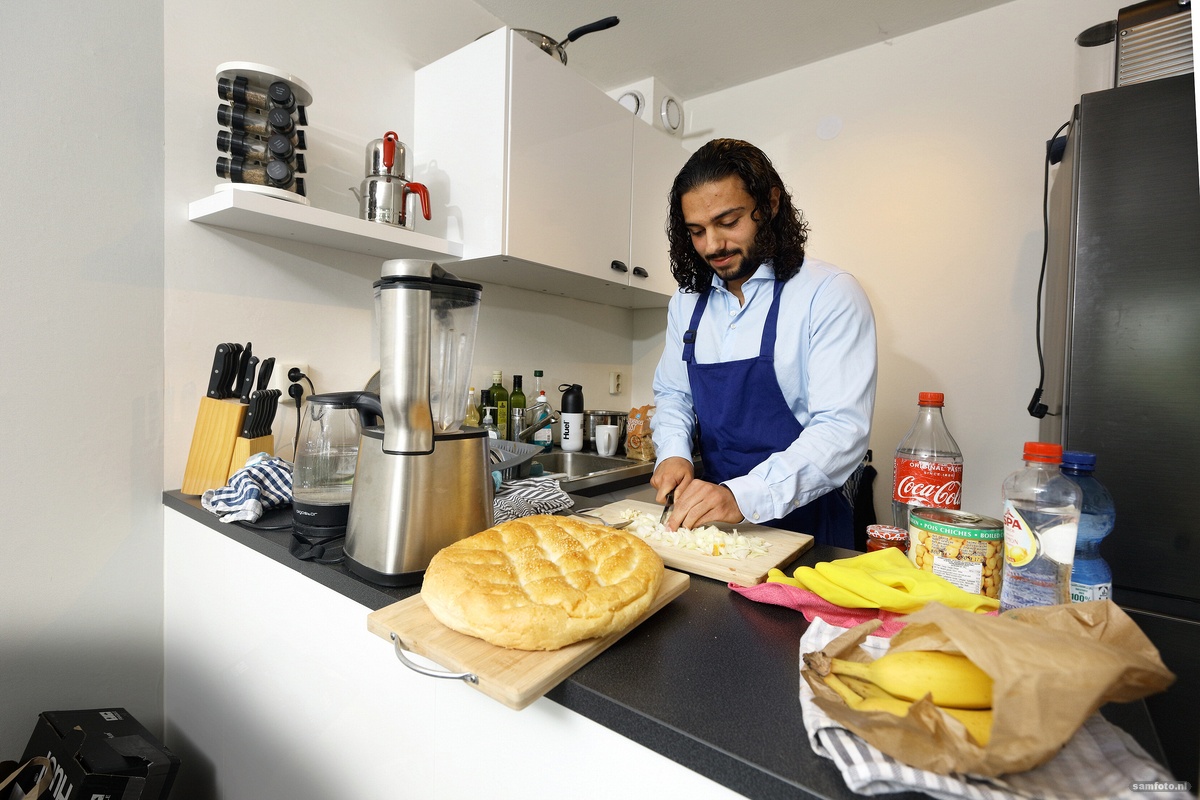The Stadt brothers own, not rent, their eco-friendly home. With solar panels, a community garden, and vegan ‘borrels’, House Deju embodies a sustainable student lifestyle.
Dennisz and his brother eat vegan, and this lifestyle also shapes Dennisz’ social life. (Photo: Sam Rentmeester)
English only
- Address: Ecodusweg, Delft
- Number of residents: 2
- Shared rooms: Bathroom, kitchen, common room
- Rent: EUR 280
- Landlord: Home owned by parents
- How to get this house: Buy it!
- Together: Cooking, eating, watching TV, gliding
Most students in the Netherlands are familiar with the process of renting rather than buying their own home. Two brothers, Dennisz and Justin Stadt, live in House Deju in the west of Delft. Delta sits with Dennisz, who is 22 years old and studies Technology, Policy, and Management at TU Delft.
The interior of his apartment is minimalistic and neat, while being cozy and inviting. The modern teal couches are arranged around a bookshelf, which contains classic and modern literature. In front of the couch are a couple of gaming consoles hooked up to a TV. A wooden cut-out of the seven continents and a Middle Eastern rug give the space extra character.
“It is good to live with my brother together in our own house,” says Dennisz. “I like that it’s a continuation of our home life and I don’t have to live with people I don’t know.” He and his brother split chores in the house, and they go back together to their family in Brabant to go gliding on the weekends.
‘Renting is more expensive than owning’
It’s not often that students buy a home rather than rent it. “Renting is more expensive than owning,” he explains. “We found this place online, and this was one of the cheaper options. It was originally a one-bedroom, but there was enough space to make it a two-bedroom. Our parents were able to increase their mortgage so we could buy this place, and my brother and I invested our own money into this house, and now we pay our parents rent every month. We see this house as a good financial investment.”
House Deju is a part of a larger housing complex that is designed to be eco-friendly, which is evident in the honeycomb layout of the complex and green wooden façade. “This apartment building was designed to be very ecological, human-friendly and animal-friendly,” says Dennisz. “This building is also made from wood for that same reason. It has a hexagonal layout and a huge benefit of that is that every apartment has a lot of windows, so there’s a lot of natural light.”
The eco-friendly design also saved Dennisz and his brother from feeling the impact of the energy crisis last year. “There is shared heating,” he says, “and there are also solar panels, so we don’t pay for electricity. The panels produce more than we use.”
The complex is designed to promote collaboration between the tenants of the apartments. The tenants – mostly working persons and families – have a roof terrace and a community garden maintained by a hired gardener. “The terrace also has a beehive,” says Dennisz, “but it is not for honey. Actually, these bees are meant to pollinate the plants around the area.” In the shared garden, there is also a chicken coop that provides fresh blue eggs.
While Dennisz hangs out on the terrace and has plants in the garden, he does not make use of the eggs from the community’s chickens. Dennisz and his brother eat vegan, and this lifestyle also shapes Dennisz’ social life. “In Leiden, I was a board member of the Vegan Students Association, and next year I will be on the board of the same association in Delft. This apartment is a great place to host a ‘borrel’ (Dutch for drinks).”
Dennisz is part of multiple student associations, but hopes to join one more. “I am a candidate for the board of the housing association of this complex,” he says. “It maintains all the shared spaces and collects money from the residents to maintain the complex.”
- Also read episode 1 of our housing series: Thirteen elite atheletes in one house.
Gabriela Godlewski / Freelance journalist



Comments are closed.